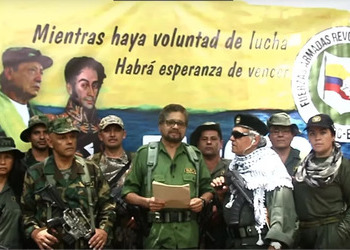As one former rebel leader reappears and urges his army to continue a losing fight, a rival dissident faction is expanding its presence, even as it prepares for a peace dialogue with the Colombian government.
Colombian Foreign Affairs Minister Álvaro Leyva confirmed that Luciano Marín Arango, alias “Iván Márquez,” commander of ex-FARC mafia faction the Second Marquetalia, is alive and well. Leyva made comments about Márquez’s health after Colombian media outlet Caracol Radio released an audio recording of the commander, who was widely reported dead on July 7.
The reports came a year after Márquez was injured in a June 2022 attack allegedly carried out by Colombian security forces. Media outlets initially reported that he had been killed in the attack, then said he had only been gravely injured. His alleged death in July this year was attributed to those injuries.
SEE ALSO: Death of Iván Márquez Simplifies Colombia Peace Negotiations
Márquez was one of the leading negotiators of the 2016 Peace Agreement between the Revolutionary Armed Forces of Colombia (Fuerzas Armadas Revolucionarias de Colombia – FARC) and the Colombian government. After several run-ins with the Colombian and US justice systems, which he claimed to be a “betrayal of the agreement,” in December 2021 he abandoned the peace accord and announced the formation of a new dissident group, the Second Marquetalia.
After months of hiding, and with the majority of his forces in Venezuela — long a refuge for Colombia’s guerrillas — Márquez and his group contacted the Colombian government in October 2022 to be part of President Gustavo Petro’s peace strategy, dubbed “Total Peace.”
The Second Marquetalia is not the only dissident group looking to negotiate. Another is the Central General Staff (Estado Mayor Central – EMC), led by Néstor Gregorio Vera, alias “Iván Mordisco,” who was also falsely reported dead last year. The EMC refused to participate in the 2016 Peace Agreement.
The Second Marquetalia and the EMC have fought each other on multiple occasions, both in Colombia and neighboring Venezuela. Each has sought to position itself as the natural successor of the FARC and unite different groups that claim FARC heritage.
InSight Crime Analysis
Márquez’s second resurrection puts an apparently weakened Second Marquetalia back on the map, though with little room for maneuvering. Meanwhile, the EMC arrives at the negotiating table on its own terms and in robust health.
The Second Marquetalia maintains a dialogue with the Colombian government, and Márquez’s return has brought renewed attention to the group and its approach to peace talks. However, the bulk of its forces are in Venezuela, and the group controls only a few territories in Colombia, some of which are areas of conflict with the EMC.
Márquez’s death would have led to a restructuring of power in the areas the Second Marquetalia controls. But even with Márquez alive — though in questionable health — the group’s survival is in doubt. It has lost three of its top four leaders — Hernán Darío Velásquez Saldarriaga, alias “El Paisa,” Henry Castellanos Garzón, alias “Romaña,” and Seuxis Pausías Hernández Solarte, alias “Jesús Santrich” — in the last two years. Contradictory reports about its leadership make the group appear disorganized and weak. It is possible that for the Second Marquetalia, a peace deal is now a necessity.
SEE ALSO: Iván Mordisco’s Reappearance Brings New Challenges to ‘Total Peace’ in Colombia
The EMC is in a more favorable position. With peace talks officially set to begin, the government has lifted some arrest warrants on the group’s members.
But the EMC continues to kidnap civilians and attack security forces, as well as fight for control of criminal economies. Over the last month, the group has been particularly active in the department of Meta, which connects the eastern plains, Amazon, and Andean regions and is key for drug trafficking routes. The EMC’s territorial expansion means it has a far stronger negotiating position than the Second Marquetalia.
“[The EMC] are not at the military level that the FARC achieved, but they are expanding,” said Juanita Vélez, co-founder of Conflict Responses Foundation (CORE), a Colombian research center on armed conflict.

